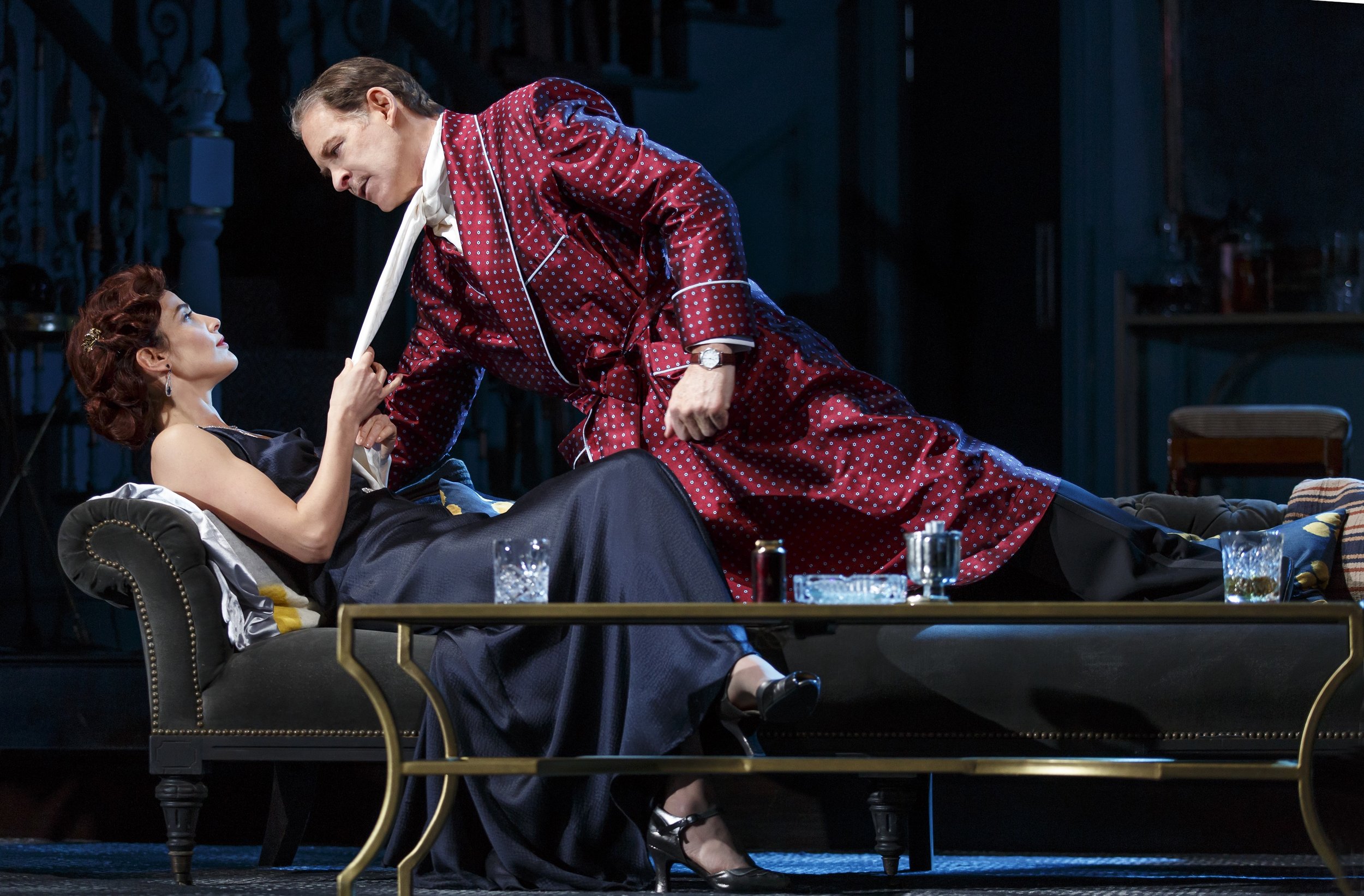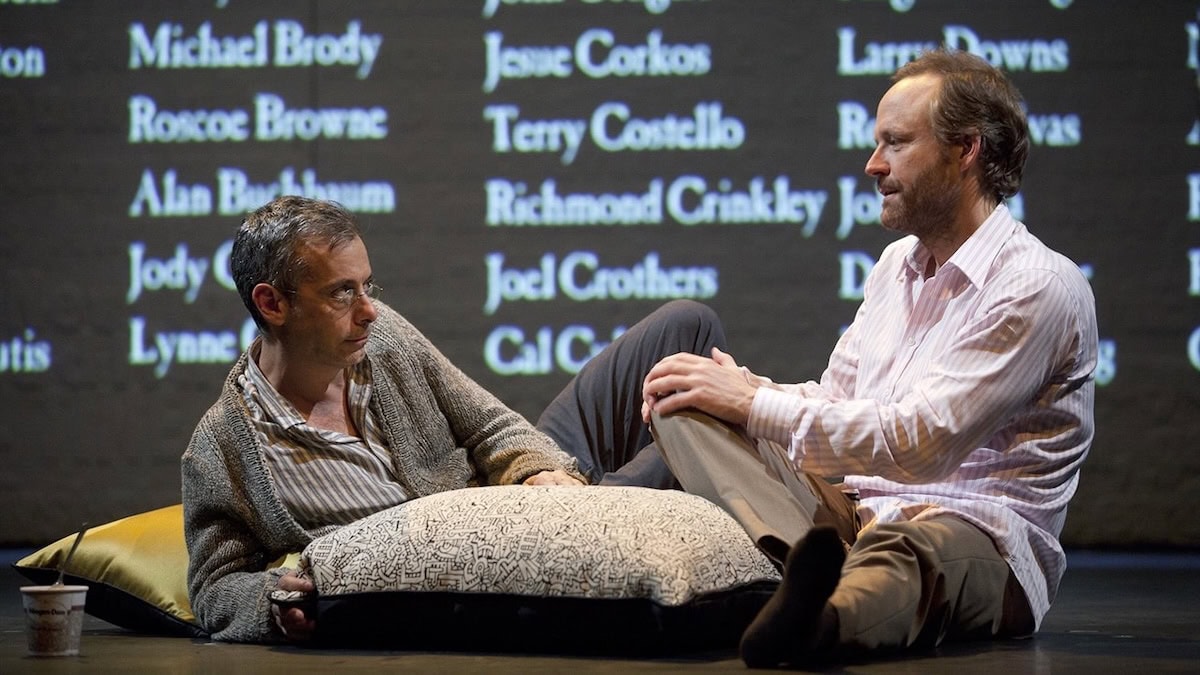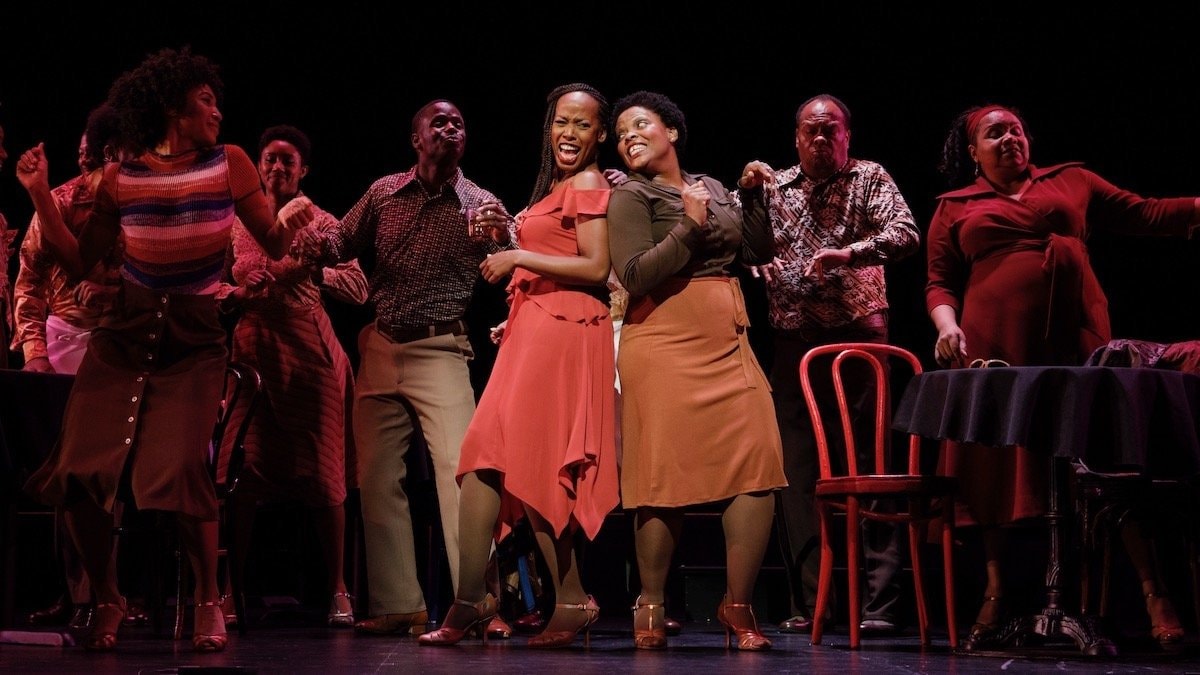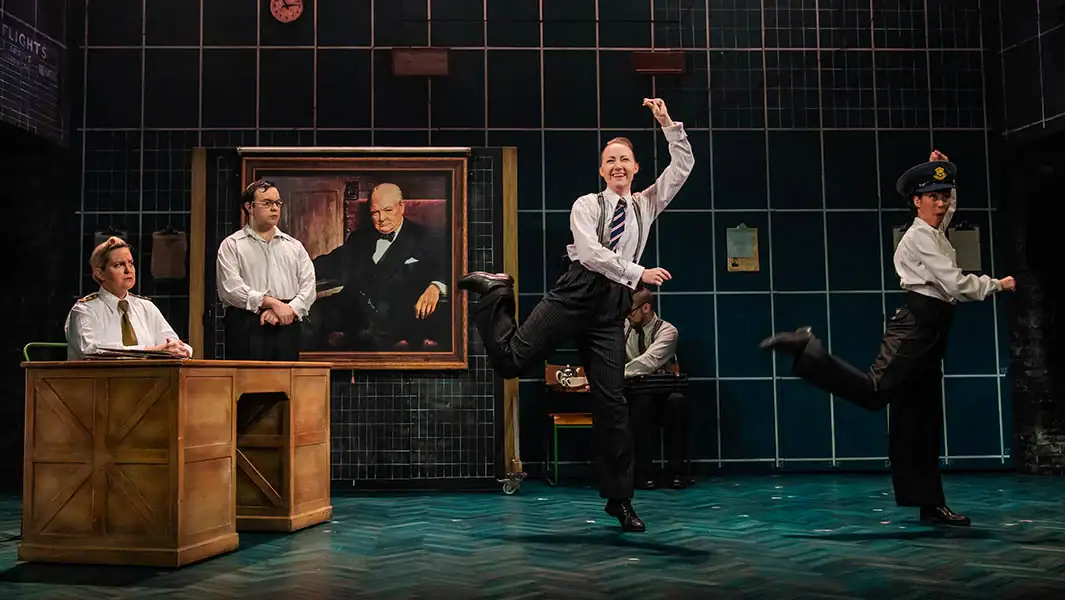
Paddy Briggs writes about the new production of Present Laughter (Sam West as Garry Essendine) including reporting on extended interviews he had with the Director Stephen Unwin prior to the first rehearsals, at the first night and later in the run when it arrived in Richmond. Unwin previously directed acclaimed productions of Hay Fever, The Vortex and This Happy Breed and has, in his words, always been keen to bring out the “psychological sub texts” in Coward who he regards as something of an “English Chekhov!”
Stephen Unwin, the Director of Present Laughter which premiered in Bath in June and subsequently went on tour to six venues around the country, admits that he was not a Coward fan as a young man and tyro Director! But later he began to appreciate The Master’s genius and in the last ten years he has directed acclaimed productions of “Hay Fever”, “The Vortex” and “This Happy Breed”. He spoke with me about his new presentation of Present Laughter at the First Night at Bath and later in advance of its week at Richmond in August. He was keen to stress that the Bath previews were work in progress and that by the time it reached Richmond it would be the real thing! It was fascinating to see the progress – by August this had become a truly outstanding production of Coward’s masterpiece.
Written in 1939 in “… the last summer of peace at Goldenhurst” (Philip Hoare), Present Laughter is the last of Coward’s five great comedies and the last in which he wrote a central character for himself. Stephen Unwin thinks that the post-war plays lacked the edge of his earlier work, perhaps because he had become more of an establishment figure, and that it is simplistic to see the earlier work as just light and comic. He sees a strong psychological sub-text in them all – not least how difficult love is! Here he says Coward is something of an English Chekhov with a huge heart. In Coward’s world the people do have three dimensions and, among the main characters at least, there is little stereotyping and there are no caricatures. The craft is astonishing – there is never a wasted word and there is a total understanding of the way that language works. Above all he was a writer who knew how to end a scene and write a good joke! Unwin describes Coward as a “theatrical phenomenon” in his versatility – his writing, performing and to an extent as an impresario. “I can’t think of anyone alive who does that. Ken Branagh does a version of it – but he can’t write plays!”
Present Laughter is full of epigrams and at times coruscating wit. It is a “well built, funny and entertaining play”. Between the opening night in Bath and Richmond Unwin had worked with the cast to improve timing on the “Laugh lines” – more pitch and “hitting the jokes”. He says that “The actors were not quite on it all the time on the first night”. And Sam West tweeted after that first night “Have now played Garry Essendine to real humans all the way through & mostly in the right order. Some sort of river crossed”. This suggests a justified relief at having reached an important point but also an acknowledgement that there is a fair bit still to do! During the preview run Unwin made a few minor cuts and generally tightened the action. It was very noticeably successful. In the first Act (especially) at Bath many of the jokes had been missed by the audience and it was a bit quiet. By Richmond the aisles at times were rocking with laughter. There is a virtuous circle here. As the audiences responded to the play so the cast grew in confidence and enjoyed it more – this further improved the performances and the audience reactions. As a former director of the “English Touring Theatre” (which he founded) Unwin clearly knows how to work with a cast on tour! For example Coward’s genius in the establishment of Garry Essendine as a character, in this subtle but brilliantly funny exchange before Garry has even appeared, was fully appreciated by Richmond though a bit missed on that first night in Bath:
Daphne: I think he’s even more charming off the stage than on, don’t you?
Monica: I can never quite make up my mind.
Daphne: Have you been with him a long while?
Monica: Just on seventeen years.
Daphne (enthusiastically): How wonderful! I expect you know him better than anybody.
Monica: Less intimately than some, better than most.
Daphne: Is he happy, do you think? I mean really happy?
Monica: I don’t believe I’ve ever asked him.
The absence of type-casting is important. “These are,” says Unwin “Real human beings, albeit ones who crack good jokes.” I asked him about the charge of snobbery raised again in some of the critics’ notices. Lyn Gardner in “The Guardian” called it a “deeply unpleasant play” and accused Unwin of “trying to disguise its misogyny and snobbishness”. Unwin says that he finds that charge simply untrue pointing not just to Coward’s own humble roots but to the fact that in plays like “This Happy Breed” he had skilfully created sympathetic working-class characters. In Present Laughter there is his valet, Fred, who far from being what Gardner calls a “stock” character is, in Unwin’s view a shrewd and happy individual of whom Essendine is probably rather jealous. When Garry accuses Fred of being “dreadfully immoral” because he has “been taking advantage of Doris for over two years now”
Fred replies “Why not? She likes it. I like it and a good time’s ‘ad by all”. The only aristocrats in the play, Lady Saltburn and Daphne her niece, are gently laughed at in an almost Wildean way. Garry is quite unimpressed by the fact that he has just spent the night (or some of it) with a débutante! As far as misogyny is concerned Unwin agrees that the strongest characters in the play are the women (by far). In their various ways Monica (a fine performance by Phyllis Logan), Liz and Joanna manipulate Garry ignoring his studied pretensions and put him in his place. The men (Garry included) are weak, vulnerable, unreliable and vain. A charge of misandry might be more appropriate!
The “family” around Garry resembles the real world of Noël Coward’s life with Monica being closely based on Noël’s own secretary Lorn Loraine. This is his team and it is a symbiotic relationship. Essendine is the head of the firm but needs them and they need him emotionally, financially or some combination of the two. This entourage loves Garry, says Stephen Unwin, “in the same way that you might love a delinquent child”. The outsiders struggle to break through the invisible barriers created by the inner clique. Roland Maule and Daphne Stillington have youth and obsessive devotion to Garry’s talent as an artist as their drivers whereas for Joanna it is the rewards of dalliance both carnal and, one suspects, status. Another conquest! I asked Unwin about the casting of Joanna and he said that he was above all looking for someone who was “extremely desirable” – except that he used a rather more blunt word than “desirable”! She is “an incredibly gorgeous, sexually alluring woman who knows what she wants. She is independent minded, unconventiona
l and a predator.” Like Myra Arundel in Hay Fever she “… goes about using Sex as a sort of shrimping net”. Zoe Boyle oozes sex-appeal alright but also gives a very complete, shrewd and feminist performance.
Roland Maule is a curious character, one of the oddest in the Coward oeuvre. For Unwin his presence is to allow Coward to make some satirical comments about what he saw as “awful” and pretentious modern drama such as WH Auden and Christopher Isherwood’s “The Ascent of F6” which had had a brief run 1936 – Unwin thinks that Coward’s reference to the “theatre of tomorrow” and to Maule’s “turgid and pretentious” play as being a “… meaningless jumble of adolescent, pseudo-intellectual poppycock [which] bears no relation to the theatre or to life or to anything” is a sideswipe at Auden and others!
Noël Coward was approaching the age of 40 when writing Present Laughter and 42 when it was first performed. Garry Essendine is the same age and this is, of course, no coincidence. “It is” says Stephen Unwin “a story about a man reaching that moment in life when the forces of gravity are taking over”. He is under pressure to modify his lifestyle – Liz tells him that “… all this casual scampering about is rather undignified…you have reached a moment in life when a little restraint would be becoming.” He is being asked to “grow up a bit”. However this is difficult because of his star status, his vanity and that it is “difficult to maintain some dignity in life in a business that is notoriously undignified” as Unwin puts it. His relationship with the Stage is love/hate. He could not live without it but it brings with it a series of frustrations which are touched upon in the play. From casting to theatre choice to the selection of material it can be difficult. This is Coward at his most autobiographical – “Garry Essendine is me” he said in a radio interview in 1972. According to Stephen Unwin Essendine is a very good actor – far better than Judith Bliss in “Hay Fever” is meant to be for example. Garry’s “overacting” (about which there is a very funny exchange with Liz and Monica) is not on the stage – only in life! For the actor it is a star part and as so often in high comedy extremely challenging because of the need for spot-on timing. He must ooze charm but also vulnerability and be self-deprecating, without really meaning it deep down. “I’m always acting – watching myself go by – that’s what’s so horrible – I see myself all the time eating, drinking, loving, suffering – sometimes I think I’m going mad” he says only partly believing it !
Sam West is a truly fine Garry Essendine (right). Between Bath and Richmond he has relaxed into the part including, I felt, at times slowing his delivery and rather living the role. He is required to be mannered and to an extent artificial – that is part of the joke and West does this well. Daphne wants to know if Garry is “really happy” suggesting that she feels that there is a tortured soul beneath the bravado, the self-confidence and, at times, the disdain. I suspect that the question is unanswerable – except by saying “sometimes”. Acting somebody overacting without overacting yourself must be difficult – but West pulls it off!
Essendine is a libertine, but in this play and in Coward generally that applies to many of the characters. Stephen Unwin wonders whether the “Emotional and sexual virtuosity” of Garry, Joanna, Henry, Morris – even Fred – seemed more thrilling in 1943 than it does now. The truth, I think, is that Coward always got away with telling stories in which there is behaviour which did not confirm to the (often hypocritical) morals of the time. From The Vortex in 1924 and Fallen Angels the following year on he managed to get plays produced about subjects which in less deft hands would have fallen at the censor. As the plot becomes more farcical and risqué in Act Three, and the doorbell rings again, in response to Joanna’s “Who’s that?” Garry says “With any luck it’s the Lord Chamberlain” – a line of such relevance (and brilliance) that only Noël Coward could have written it!
The sexual hedonism – the pursuit of pleasure without the requirement for love or commitment – is a key theme of Present Laughter. With Fred (as we have seen) but also with Joanna who is unashamed – “Who could you and I possibly harm by loving each other for a little?” Daphne, the Débutante, who “loses her latchkey” to Garry, is bubbly about it in the play’s first few lines when on the phone to her friend Cynthia “I’m you know where… yes I did…no he isn’t awake yet…I can’t wait to tell you”. She is then a romantic not obviously a prototype Joanna – “what does age matter when people love each other”. But by the time she reappears in Act II you sense that she’s beginning to work out what’s what! She clearly enjoyed the brief liaison – and wouldn’t mind a bit more! Coward had broken any inhibition about portraying sexually confident women in Fallen Angels twenty years earlier and Joanna and (potentially) Daphne are in the tradition of Julia and Jane in that play. They agreed with one another that after five years of marriage “…we’re both ripe for a lapse”! It was also in Fallen Angels that when Julia says “Its seems so unfair that men should have the monopoly of Wild Oats” Jane replies “They haven’t really, but it’s our job to make them think they have.”
Noël Coward, says Stephen Unwin, has “affection for people in all of their failings”. At nearly 40 when writing Present Laughter he was clearly aware of his own. When was he acting, and when not? The play is self-mockery and he is sending himself up – his success gave him the confidence to do this. But it is also a very perceptive play about so many things – human nature of course, but also the aging process, the battle of the sexes and above all the mad, bitchy, pretentious, exasperating but ultimately wonderful and addictive world of the theatre. Stephen Unwin thinks that in Present Laughter Noël Coward is more affectionate about and less mocking of his profession than he had been twenty years earlier in “Hay Fever”. Whilst it is perhaps not “All the world’s a stage” there is sufficient in the great strength of the characters and the dialogue in Present Laughter to confirm that Garry’s suggestion that “we might concede Chekhov a certain flimsy sense of psychology” applies equally to the “English Chekhov”!
To purchase a copy of Present Laughter click here, and to learn more about licensing a production, click here.

The Truth Behind… The Normal Heart

Musical Revues

